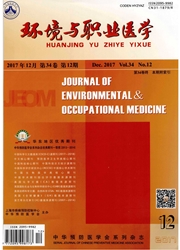

 中文摘要:
中文摘要:
[目的]对大学生每日经由塑料瓶装饮料摄入邻苯二甲酸二丁酯(DBP)和邻苯二甲酸-(2-乙基己基)酯(DEHP)的暴露量进行风险评估。[方法]通过方便抽样的方法对196名大学生进行塑料瓶装饮料摄入情况在线问卷调查,结合114种市售塑料瓶装饮料中DBP及DEHP的检测数据,计算调查人群经塑料瓶装饮料摄入DBP和DEHP的慢性每日摄入值和安全限值分布,运用蒙特卡洛概率模型拟合大学生群体DBP和DEHP每日暴露情况并进行相应的敏感度分析。[结果]受访大学生不同种类饮料摄入量不同,但男、女生的塑料瓶装饮用水摄入量均居首位。DBP和DEHP含量亦因饮料种类而各异,其中咖啡类、乳类及果汁类相对较高。大学生经塑料瓶装饮料DBP和DEHP的暴露值均低于其每日允许摄入量,安全限值均小于1。蒙特卡洛概率模型显示99.90%的大学生经塑料瓶装饮料摄入DBP的暴露量是安全的,仅0.10%存在潜在生殖发育毒性风险,男、女生的生殖发育毒性风险分别为0.02%和0.09%;大学生经塑料瓶装饮料摄入DEHP的暴露量尚不存在健康风险。[结论]大学生经塑料瓶装饮料DBP的摄入水平可能存在一定的潜在生殖发育毒性风险,DEHP的摄入水平则处于安全范围。
 英文摘要:
英文摘要:
[ Objective ] To estimate the exposure levels to dibutyl phthalate (DBP) and di(2-ethylhexyl)phthalate (DEHP) from plastic packaged beverages among college students. [ Methods ] The chronic daily intake and margin of safety of DBP and DEHP were estimated by the gas-chromatography-determined concentrations of DBP and DEHP in 114 brands of plastic packaged beverages, and the drinking patterns among 196 college students were collected via an online questionnaire using convenience sampling strategy. Monte Carlo models were applied to simulate the daily exposures to DBP and DEHP in target students and related sensitive analyses were also performed. [ Results ] The daily intakes of plastic packaged beverages varied, but the plastic packaged drinking water accounted for the largest proportion both in males and females. The contents of DBP and DEHP also varied with beverage categories, but coffee, milk, and juice beverages showed relatively higher contents. The chronic daily intakes of DBP and DEHP were less than corresponding tolerable daily intakes, and the margins of safety were both less than 1. According to the results of Monte Carlo simulation, 99.90% of the students interviewed were within the safe range of DBP exposure through plastic packaged beverages, and the rest 0.10% were at potential risks of reproductive and developmental toxicities. The probabilities of reproductive and developmental toxicity risks were 0.02% for male students and 0.09% for female students. No health risks should be concerned at the exposure levels of DEHP in sampled beverages. [ Conclusion ] The intake levels of DBP via plastic packaged beverages may pose potential risks of reproductive and developmental toxicities to college students; however, that of DEHP is within the safe range.
 同期刊论文项目
同期刊论文项目
 同项目期刊论文
同项目期刊论文
 期刊信息
期刊信息
